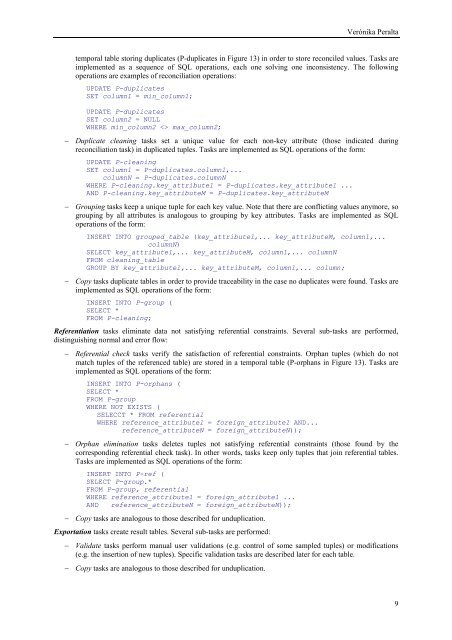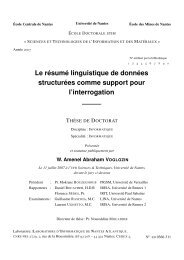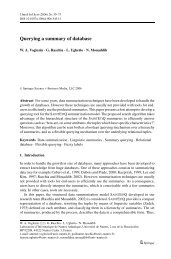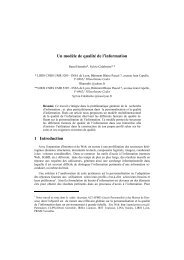Extraction and Integration of MovieLens and IMDb Data - APMD
Extraction and Integration of MovieLens and IMDb Data - APMD
Extraction and Integration of MovieLens and IMDb Data - APMD
Create successful ePaper yourself
Turn your PDF publications into a flip-book with our unique Google optimized e-Paper software.
Verónika Peralta<br />
temporal table storing duplicates (P-duplicates in Figure 13) in order to store reconciled values. Tasks are<br />
implemented as a sequence <strong>of</strong> SQL operations, each one solving one inconsistency. The following<br />
operations are examples <strong>of</strong> reconciliation operations:<br />
UPDATE P-duplicates<br />
SET column1 = min_column1;<br />
UPDATE P-duplicates<br />
SET column2 = NULL<br />
WHERE min_column2 max_column2;<br />
− Duplicate cleaning tasks set a unique value for each non-key attribute (those indicated during<br />
reconciliation task) in duplicated tuples. Tasks are implemented as SQL operations <strong>of</strong> the form:<br />
UPDATE P-cleaning<br />
SET column1 = P-duplicates.column1,...<br />
columnN = P-duplicates.columnN<br />
WHERE P-cleaning.key_attribute1 = P-duplicates.key_attribute1 ...<br />
AND P-cleaning.key_attributeM = P-duplicates.key_attributeM<br />
− Grouping tasks keep a unique tuple for each key value. Note that there are conflicting values anymore, so<br />
grouping by all attributes is analogous to grouping by key attributes. Tasks are implemented as SQL<br />
operations <strong>of</strong> the form:<br />
INSERT INTO grouped_table (key_attribute1,... key_attributeM, column1,...<br />
columnN)<br />
SELECT key_attribute1,... key_attributeM, column1,... columnN<br />
FROM cleaning_table<br />
GROUP BY key_attribute1,... key_attributeM, column1,... column;<br />
− Copy tasks duplicate tables in order to provide traceability in the case no duplicates were found. Tasks are<br />
implemented as SQL operations <strong>of</strong> the form:<br />
INSERT INTO P-group (<br />
SELECT *<br />
FROM P-cleaning;<br />
Referentiation tasks eliminate data not satisfying referential constraints. Several sub-tasks are performed,<br />
distinguishing normal <strong>and</strong> error flow:<br />
− Referential check tasks verify the satisfaction <strong>of</strong> referential constraints. Orphan tuples (which do not<br />
match tuples <strong>of</strong> the referenced table) are stored in a temporal table (P-orphans in Figure 13). Tasks are<br />
implemented as SQL operations <strong>of</strong> the form:<br />
INSERT INTO P-orphans (<br />
SELECT *<br />
FROM P-group<br />
WHERE NOT EXISTS (<br />
SELECCT * FROM referential<br />
WHERE reference_attribute1 = foreign_attribute1 AND...<br />
reference_attributeN = foreign_attributeN));<br />
− Orphan elimination tasks deletes tuples not satisfying referential constraints (those found by the<br />
corresponding referential check task). In other words, tasks keep only tuples that join referential tables.<br />
Tasks are implemented as SQL operations <strong>of</strong> the form:<br />
INSERT INTO P-ref (<br />
SELECT P-group.*<br />
FROM P-group, referential<br />
WHERE reference_attribute1 = foreign_attribute1 ...<br />
AND reference_attributeN = foreign_attributeN));<br />
− Copy tasks are analogous to those described for unduplication.<br />
Exportation tasks create result tables. Several sub-tasks are performed:<br />
− Validate tasks perform manual user validations (e.g. control <strong>of</strong> some sampled tuples) or modifications<br />
(e.g. the insertion <strong>of</strong> new tuples). Specific validation tasks are described later for each table.<br />
− Copy tasks are analogous to those described for unduplication.<br />
9







